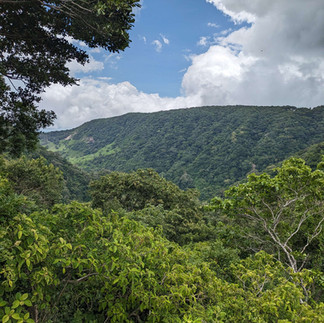Life in the Clouds
- elijahhicks0
- Sep 2, 2023
- 7 min read

The last month has found us in the clouds of Monteverde Costa Rica. Our days have been greatly varied, containing all manner of adventures and inquiries into sustainable tourism, economy, local community, and the flourishing wilderness that provides the draw to this world-renowned place. One constant, however, is our daily trip to one of the many wonderful Coffee shops. Unlike anywhere else in the world, the coffee from every place we've tried so far is heavenly. The Costa Ricans of the Puntarenas district make amazing coffee. This is likely due to the fact that the coffee is grown within a few miles of the town center cultivating a pride in the crafting of this special beverage.

Coffee and Chess. Coffee because it connects us to the place, supports local business, and fills us with delight (our barriers quickly broke down and we have given up our previous resolution to drink only decaf). Chess, because it teaches us thoughtfulness, and stirs up the competitive spirit within us (what better for a newly married couple?). In a way, there is a link to regional community development, and chess. Here's how: Chess is a game of logical conclusions. How you act at one particular move in the game, forever alters the outcome of the following moves. A good chess player must not only analyze and respond to the current board, but must also predict the future possibilities in a delicate balance. Too much attentiveness to the present, will cause oversight into the end game, or, on the other hand, too much focus on the future can cause blindness to the current predicament. One poor move spells doom.
I hate to say it, but Mo beats me. She beats me often. And then I realize that I am out of balance, too often I am trying to think so far down the line that I miss what's right in front of me, and Bam! My queen is gone, to my great dismay. Then I start to question whether she should be the one carrying out this Watson Project. Luckily for me, we're in it together. We make the best strategists paired together. The Watson project doesn't stand a chance against us.
I've mentioned Coffee and Chess. I must now add a third "C," Clouds. The constant of clouds is remarkable in Monteverde. We have an amazing little studio apartment on the outskirts of Santa Elena (which is about a 2.5 mile walk from Monteverde proper). It's about a ten-minute walk from the town center (and 23 local coffee shops with it). Our apartment is on the second story, overlooking some fields, jungles, mountains, and in the distance, the Nicoya Peninsula known as one of the world's five "blue zones" where people consistently live to be over a 100.
On some evenings we can see the ocean and the distant rising mountains in crisp detail. Then we feel like readers of an adventure tale looking upon the decorated map of the adventure before us. Where will the distant mountain lead? What many creatures live on it? Who would we meet if we traveled so far? Will we be eaten by the sea monster? No? More likely, sucked dry by the giant Mosquito in the dead of night, then?
Other evenings the distance is hazy, covered in thin veils of mist. Those evenings make for the best sunsets. My goodness! The world is set ablaze. Great reds meld into sharp oranges, purples, the many blues of the sky all contrasted against the clean white of the clouds, unfolding into a magnificent display over the distant reflecting ocean.
Still other evenings, we live in the clouds. Yes...the clouds come down upon us and consume our house. Then the mist floats around us like a mystical dream. A hundred yards--at best, is all you can see. Once, while walking home, Mo ran ahead, and as I watched she disappeared completely into the fold of the clouds.
As children, we were disappointed to learn the clouds are vaporous, not solid as they seem in the sky. The second-best thing to a solid cloud is surely to walk within them. There is truly something magical and mysterious to being enveloped by so much water vapor. Nowhere else on earth does this happen so consistently and intensely. But this makes sense, we are, after all, in one of the world's only cloud forests, in which the clouds are such a constant that they alter the very ecosystem they envelop, providing habitat for species found nowhere else on earth.
Most mornings we leave the house late, after making a comida tipica breakfast of red beans and rice, paired with a papaya lime smoothie. Oh! And mangoes! Did I mention the mangos? Most mornings are full of mangoes. Lovely, delicious, sweet, heavenly mangoes. When you bite into them, the juice runs all down your face and into your shirt, if you're not careful. In fact, the mangoes are so huge that you can't eat them properly without cutting them up. The flesh is too deep to bite all the way into and you end up gagging yourself in this golden fruit of the gods (not a bad way to go if you ask me). It is mango season, and mangoes grow all around. On the bus ride up to Monteverde, I saw trees with fruit just left on the ground. The good news of such an abundance is that mangoes are one of the cheapest foods here. In fact, all other food is quite expensive due to the tourist nature of the town.
But I was saying...after a lovely breakfast, we leave our apartment in the crisp shining sun, with birds of all kinds singing in the nearby trees, and little hummingbirds whizzing by our heads. Usually we leave for the day first for a coffee shop where we organize and accomplish the tasks of our day. Other days we leave for a prearranged tourist adventure, such as a tour of the giant El Tigre waterfalls. But one thing is a must: rain jackets, and accompanying ponchos and backpack covers. No matter how sunny, hot, blue skied. The rain will come. We learned this lesson the hard way. On a beautiful day with not a cloud in the sky we innocently left home, made the 2.5 mile trek to Monteverde, and were soon bombarded by a fierce tropical storm. After waiting hours for it to pass, we finally broke down and bought ponchos. The lightning, horizontal winds, and whipping rain left us soaking wet only minutes into the walk home--despite the ponchos. Thankfully the electronics in our backpacks suffered no injury.
Speaking of electronics, one wrench in my work has been my dead computer! (I promise it had no relation to the rain, it was dead before the aforementioned incident) About three weeks ago, I went to update my computer, and when it restarted it showed an error screen. After about eight hours of chatting with support they sent along a tech to replace the hard drive (luckily they have a service team in CR). When that didn't work, more hours on the phone revealed a dead motherboard. For a few month-old computer this is both puzzling, and frustrating! The repair is currently set for Oct 10th! Needless to say, this has made my work of researching and recording what I'm learning difficult. I will leave that as the excuse for the period of silence in blogging. I am now writing from Moriah's computer now that she's finished her most recent grant project. I really do hope to find a solution for my computer before next month!
The time in Monteverde so far has been amazing and full. Sundays have found us at the Quaker meeting house where we have gotten to meet the community and hear some of the stories of the transition of this area from dairy to tourism and conservation. From these meetings I have connected with community members involved in amazing work in the region working to protect the community and environment from the darker sides of tourism.
In many ways, so far Monteverde has done an incredible job at harnessing tourism in positive fashion using the input to provide meaningful jobs for the local people and protect the rare forests which provide the backbone for the tourism draw to the region. That's not to say that Monteverde doesn't have its own set of ills and dark sides to tourism, but in many ways there are checks and balances set in place that limit the impacts of these effects.
One fascinating example of this was the community successfully shutting down a commercial hotel attempting to move in. The resort wanted to build 500 rooms with all the amenities, pools, restaurants, you name it, on the edge of the Children's eternal rainforest. But the local water district, which is run by community members, voted against supplying the enterprise with water. And that was the end. Now a big for sale sign sits on the spot, waiting to turn over the losses.
As for cutting down forests, forget about it. There are stringent rules in place on a national level that make it very difficult for land to be developed on a large scale. What is encouraged instead, is building around the trees. As for foreign national chains moving in, a lot of power is given to the local population to decide whether or not they can come in. And for the most part, they have been kept out. From our time here, we have seen very few, if any chain stores. Businesses are almost all exclusively locally owned and run.
Another exciting development in swing is the creation of a new "canton." There are currently five cantons in Costa Rica. A canton is kind of like a state, and the capital of the canton manages the taxes for the region. Currently all the taxes for tourism are going to the capital of Puntarenas on the Nicoya peninsula, meaning that the infrastructure in the Monteverde region is poorly upkept. But due to hard work from local advocates at a national level, in 2024, Monteverde will become its own canton, allowing for funds to stay in the region improving infrastructure and managing the impacts of tourism in a more efficient and concrete way.
There is much more I could share,and will share on what we have learned and experienced in our time in this magical place. This is only a taste of it. In summary, our first month on Watson has been full of good things including people, place, and adventure. We can't wait to see what the next days, week and months will bring.
Our current plans are to stay in the Monteverde region until the 17th of September, and then head on to explore some of the cutting edge permaculture operations in the country, and La fortuna. We may also witness the launching of the world's first modern sustainable cargo ship: a giant sailboat made to transport carbon neutral coffee (currently cargo ships are on their way to produce 17% of the world's emissions). Thirty large cargo ships emit as much as 1.45 billion cars, with 2000 times the sulfur found in the transport fuel. You can read more about that project here.
On Oct. 26th we fly to Honduras.
















































Comments